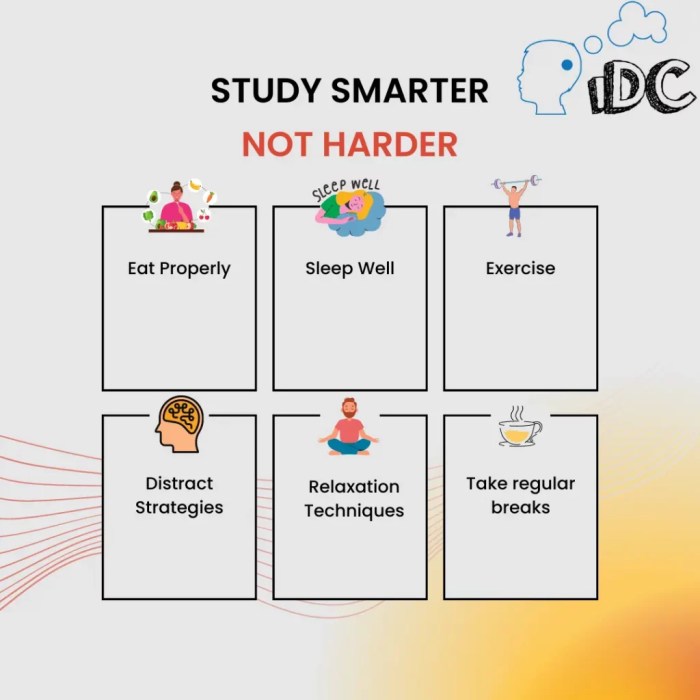Effective study techniques for exams are crucial for academic success. From note-taking strategies to time management tips, this comprehensive guide will help you ace your exams with confidence and efficiency.
Get ready to discover the best methods to enhance your memorization skills and optimize your exam preparation routine.
Techniques for Effective Note-Taking

Effective note-taking is crucial for retaining information and preparing for exams. By following specific techniques, students can improve their study habits and boost their academic performance.The Cornell note-taking system is a popular method that helps students organize their notes effectively. This system involves dividing the paper into different sections, including a cue column, a notes column, and a summary section.
The cue column is used to jot down s or questions, the notes column is where the main information is written, and the summary section allows students to review and reinforce their understanding of the material. By using this structured approach, students can easily review and recall information when studying for exams.
The Benefits of the Cornell Note-Taking System
- Enhances organization and structure of notes
- Facilitates active engagement with the material
- Promotes effective review and retention of information
- Helps in identifying key concepts and connections
Mind mapping is another technique that can aid in note-taking efficiency. This visual representation allows students to connect ideas, concepts, and s in a non-linear format, making it easier to understand complex topics and see relationships between different pieces of information. By creating mind maps, students can enhance their creativity, critical thinking skills, and overall comprehension of the subject matter.
Tips for Organizing Notes for Better Retention
- Use abbreviations and symbols for faster note-taking
- Highlight key points or important information
- Review and revise notes regularly to reinforce learning
- Create a dedicated study space free from distractions
Time Management Strategies for Studying
Effective time management is crucial when preparing for exams. By utilizing strategies like the Pomodoro Technique, creating a study schedule, and prioritizing tasks, students can maximize their productivity and enhance their learning experience.
The Pomodoro Technique
The Pomodoro Technique is a time management method developed by Francesco Cirillo in the late 1980s. It involves breaking study sessions into short intervals, typically 25 minutes, separated by short breaks. This technique aims to improve focus and concentration by working in short bursts of time, known as “Pomodoros”. After completing four Pomodoros, a longer break of 15-30 minutes is taken.
This method can help students maintain a balance between studying and resting, ultimately leading to better retention of information.
Creating a Study Schedule
Developing a study schedule is essential for effective time management. By allocating specific time slots for each subject or topic, students can ensure they cover all necessary material while avoiding last-minute cramming. It is important to set realistic goals and stick to the schedule to maintain consistency in studying. Additionally, incorporating breaks and leisure activities into the schedule can prevent burnout and improve overall productivity.
Prioritizing Tasks and Topics
Prioritizing tasks based on their importance and difficulty level is key to efficient studying. By identifying high-priority topics or subjects that require more attention, students can allocate more time and resources accordingly. Breaking down tasks into smaller, manageable steps can also help in tackling complex subjects. Additionally, utilizing techniques like the Eisenhower Matrix, which categorizes tasks based on urgency and importance, can aid in prioritizing effectively and maximizing productivity.
Effective Memorization Techniques: Effective Study Techniques For Exams
In order to excel in exams, it is crucial to have effective memorization techniques in place. By utilizing strategies such as spaced repetition, mnemonic devices, and active recall, students can enhance their memory retention and recall during exams.
Spaced Repetition and Long-Term Memory Retention
Spaced repetition is a learning technique that involves revisiting information at increasing intervals over time. This method capitalizes on the psychological spacing effect, which suggests that information is better retained when it is reviewed multiple times at spaced intervals. By spacing out study sessions and reviewing material regularly, students can strengthen their long-term memory retention and recall.
Mnemonic Devices for Remembering Complex Information, Effective study techniques for exams
Mnemonic devices are memory aids that help individuals encode and recall complex information more easily. These devices can take the form of acronyms, rhymes, or visual imagery that create associations with the information to be remembered. By using mnemonic devices, students can simplify difficult concepts and make them more memorable, thereby improving their ability to recall information during exams.
Strategies for Active Recall to Enhance Memory Recall
Active recall is a learning technique that involves actively retrieving information from memory rather than passively reviewing notes or textbooks. By practicing active recall through methods such as flashcards, self-testing, or teaching the material to someone else, students can strengthen their memory recall and reinforce their understanding of the material. This strategy not only enhances retention but also improves the ability to recall information accurately during exams.
Tips for Effective Exam Preparation

Creating the right study environment, utilizing teaching methods, and practicing past exam papers are crucial for effective exam preparation.
Creating a Study Environment Conducive to Focus and Productivity
Setting up a comfortable and organized study space can significantly impact your focus and productivity. Here are some tips:
- Avoid distractions such as noise, clutter, or electronic devices that are not related to studying.
- Ensure good lighting and ventilation in your study area to prevent fatigue.
- Keep all necessary study materials within reach to minimize interruptions.
Teaching Concepts to Others as a Study Method
Explaining concepts to others can help reinforce your understanding and retention of the material. Here’s how you can use this method effectively:
- Teach a friend or family member about the topics you are studying.
- Engage in group study sessions where each member takes turns teaching a concept to the rest of the group.
- Use visual aids and real-life examples to simplify complex ideas for better comprehension.
Practicing Past Exam Papers and Mock Tests for Better Preparation
One of the most effective ways to prepare for exams is by practicing with past exam papers and taking mock tests. Here are some benefits and tips:
- Get familiar with the exam format, types of questions, and time constraints by practicing past papers.
- Simulate exam conditions during mock tests to build confidence and improve time management skills.
- Identify your weak areas and focus on improving them through targeted study and practice.